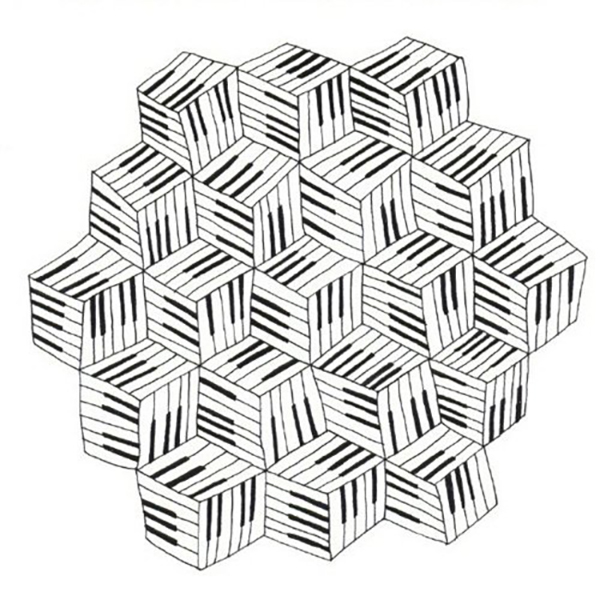
by Ian Mann
October 31, 2008
/ ALBUM
Mitchell's best album to date and a worthy addition to the piano trio canon
Pianist Robert Mitchell has been an influential figure on the British jazz scene for a number of years now. A member of the F-ire Collective this is, surprisingly, Mitchell’s first recording in the piano trio format. His previous releases have seen him leading his six piece jazz/soul band Panacea on the albums “Voyager” (2001) and “Trust” (2005). Later came a dazzling duo recording with Cuban violinist Omar Puente “Bridges” (2006) and the challenging solo piano opus “Equinox” (2007).
“The Greater Good” appears on the new Jazz Services recording outlet which was recently established in conjunction with 33 Records. It is probably his most conventional and accessible recording so far but with some sparkling playing from all three protagonists it is also his best. Joining Mitchell are the outstanding young talents of Tom Mason (bass) and Richard Spaven (drums). Both have played extensively with Mitchell for a number of years as the rhythm section of Panacea (still a going concern) and more recently as 3io, with a regular gig at North London’s renowned Vortex jazz club.
As a result the interplay between the three musicians is excellent with a high degree of interaction.
The material mainly comes from the pen of Mitchell but both Mason and Spaven contribute a tune each, the drummer collaborating with Dutch musician Vincent Helbers on the title track. The trio also tackle Galt McDermot’s “Space” and there is a stunning version of Massive Attack’s “Teardrop”. Wayne Shorter’s “Dance Cadaverous” (from The Shorter album “Speak No Evil”) is the closest they get to a jazz standard. This tune is one that is becoming an increasingly popular vehicle for the younger generation of jazz musicians.
Mitchell is a phenomenal pianist with an awesome technique. Classically trained he can also be very intense but there is a relaxed quality about “The Greater Good” that has not always been present on his previous albums. In addition to the classical influences there are also hip hop grooves and broken beats and in Mitchell’s percussive style the occasional nod to old masters like Thelonious Monk. It all adds up to an absorbing album that covers many bases.
The album opens with Mitchell’s folk tinged tune “Cumulus”, with Mason also featuring as a soloist, the first of several such contributions over the course of the album.
Another Mitchell original follows in the form of “A Map Of The Sky”. Again the trio expand from a relatively simple melody into something more complex with highly pleasing results, the whole gently propelled by Spaven’s subtle grooves.
Shorter’s “Dance Cadaverous” is a tour de force for Mitchell with his tumbling runs and there is an energetic face off between Mitchell and the outstanding Spaven.
The swirling,impressionistic “Quantum”, another Mitchell original is quickly followed by a brief and enjoyable romp through McDermot’s “Space”.
Tom Mason’s composition “Ochre” is the longest item on the record. It winds it’s way romantically and elegantly for some eight minutes but is faded out rather abruptly. It is followed in turn by Mitchell’s “Crystal Eyes” which mines similar territory.
Next we come to the trio’s version of the massive attack tune “Teardrop”. A highly melodic piece this is very much a feature for the excellent Mason. He states the melody first on pizzicato bass before picking up the bow midway through the song. His brilliant arco playing is reminiscent of Dan Berglund’s work with e.s.t. and is buoyed by Spaven’s implacable groove. Dramatic and attention grabbing this is the stand out cut on the album. It is a piece that if played in isolation has the potential to appeal to a wide musical audience. Sadly in this country it is unlikely to get any radio play other than on specialist programmes which is a shame as I sense it would hold a broad appeal.
Mason is again prominent on Mitchell’s “The Blessing” a gospel tinged tune with yet another strong melody acting as the foundation for Mitchell’s piano ruminations.
Finally come Spaven and Helbers’ title track described by Mitchell as a “leitmotif” for the album. Grooving and melodic it features some dazzling player from the leader and superb support from his band mates.
Less intense than some of his previous projects and sounding all the better for it “The Greater Good” is Robert Mitchell’s best album thus far. Full of attractive melodies and supple grooves it is a worthy addition to the piano trio canon.
3io are currently touring to promote the album See http://www.myspace.com/robertmitchellmusic. Also www.jazzservices.org.uk
blog comments powered by Disqus